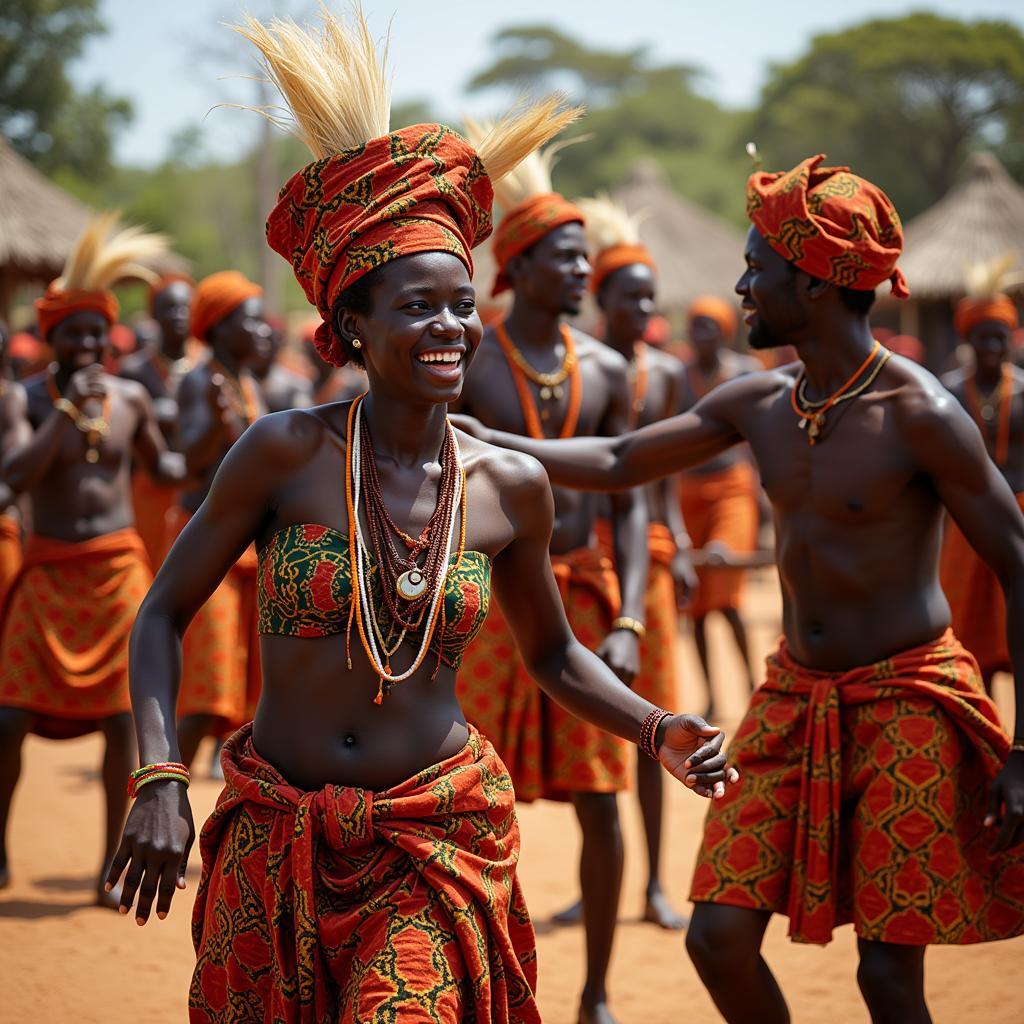Exploring the African Hindu Population
The African Hindu Population represents a vibrant and often overlooked aspect of religious diversity on the continent. This community, with its rich history and cultural traditions, has woven itself into the fabric of African societies, contributing significantly to the continent’s tapestry of beliefs and practices. Let’s delve deeper into this fascinating intersection of faith and culture.
Hinduism in Africa boasts a long and complex history, primarily linked to the historical ties between India and the eastern coast of Africa. These connections, fostered through trade and migration, brought Indian merchants and laborers to African shores, introducing their religious and cultural practices to the continent. Learn more about the continent itself through this resource: about african continent in hindi.
A Historical Journey: The Roots of Hinduism in Africa
From the early centuries AD, trade routes crisscrossing the Indian Ocean facilitated the movement of people and ideas. Indian merchants established communities along the East African coast, particularly in regions like Kenya, Tanzania, Uganda, and South Africa. They brought with them their religious beliefs and practices, establishing temples and community centers that became focal points for the burgeoning Hindu population.
Over time, Hinduism in Africa evolved, adapting to local contexts and interacting with existing African traditions. This resulted in a unique blend of Hindu beliefs and practices, often incorporating elements of indigenous African spirituality.
The Diversity of African Hindu Communities
The African Hindu population is not monolithic. Different communities maintain diverse practices and traditions, reflecting the varied origins and historical experiences of Hindu groups across the continent. Some communities adhere closely to traditional Hindu scriptures and rituals, while others have developed syncretic forms of Hinduism that incorporate elements of local African beliefs. For insights into how African traditions are celebrated elsewhere, check out: african holidays celebrated in america.
Where are most Hindus in Africa located?
Many Hindus reside in countries like South Africa, Kenya, Mauritius, Tanzania, and Uganda. South Africa holds the largest Hindu population on the continent.
Cultural Expressions: Festivals and Traditions
Hindu festivals and traditions play a vital role in the lives of African Hindus, providing opportunities for community gatherings, spiritual reflection, and cultural expression. Diwali, the festival of lights, is a major celebration in many African Hindu communities, marking the triumph of good over evil and light over darkness. Learn about a unique perspective on this celebration at: african diwali. Holi, the festival of colors, is another vibrant celebration, signifying the arrival of spring and the victory of good over evil.
These festivals are often celebrated with great enthusiasm, involving prayers, rituals, music, dance, and feasting. They serve as important occasions for reinforcing community bonds and transmitting cultural heritage to younger generations.
The Modern African Hindu Experience
Today, the African Hindu population continues to thrive, contributing to the social, economic, and cultural landscape of the continent. They maintain strong ties to their religious and cultural heritage while also actively participating in the broader African societies.
How has the African Hindu population contributed to society?
African Hindus have played significant roles in various fields, including business, education, politics, and the arts. They have also been active in promoting interfaith dialogue and understanding.
Challenges and Opportunities
Like any community, African Hindus face certain challenges. These may include maintaining their religious and cultural identity in a rapidly changing world, combating prejudice and discrimination, and addressing issues of social and economic inequality. You can find further information on the diverse experiences of African communities at: african indian mix baby.
However, they also have numerous opportunities to contribute to the development and progress of their respective countries. By leveraging their skills, knowledge, and resources, African Hindus can play a crucial role in building a more inclusive and prosperous future for all.
Conclusion: A Vibrant Tapestry
The African Hindu population is a testament to the diversity and dynamism of religious and cultural expression in Africa. Their story is one of resilience, adaptation, and contribution, highlighting the rich tapestry of human experience on the continent. The African Hindu population continues to evolve, playing an integral role in shaping the future of Africa.
FAQ
-
What is the origin of the Hindu population in Africa?
Primarily through trade and migration from India along the East African coast. -
Which African country has the largest Hindu population?
South Africa. -
What are some major Hindu festivals celebrated in Africa?
Diwali and Holi.
Expert Insights:
- Dr. Priya Sharma, Professor of African Studies: “The African Hindu community represents a fascinating example of cultural exchange and adaptation. Their unique blend of Hindu and African traditions enriches the cultural landscape of the continent.”
- Mr. Rajesh Patel, Community Leader: “Hinduism in Africa is not static; it’s a living tradition that continues to evolve, reflecting the changing needs and aspirations of our community.”
- Ms. Anika Singh, Cultural Historian: “The contributions of African Hindus to society are significant and deserve greater recognition. They have played vital roles in various fields, enriching the fabric of African Life.”
Further Exploration: Explore more about African cultural influences.
Call to Action: For any assistance, contact us at Phone: +255768904061, Email: kaka.mag@gmail.com or visit us at Mbarali DC Mawindi, Kangaga, Tanzania. Our customer service team is available 24/7.

